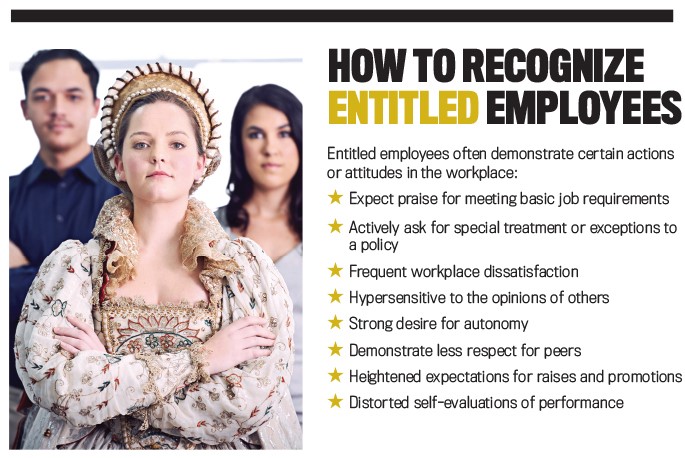Does Entitlement Exist On Your Team?

Seems like quite a few conversations I hold with my Leaders over the last year are focusing on entitlement. Some say it’s the millennials, others say Baby Boomers, some say it comes from generations in between. It seems like the millennials I work with, albeit from a University setting, don’t seem entitled to me, so have I come to the conclusion that it can be a problem for any generation. (To keep everyone age referenced, millennials were born between 1980 and 1999, Gen Xers between 1965 and 1979, and baby boomers between 1946 and 1964.
Are the above some of the behaviors you see from a select few of your team members?
Tasha Eurich writes in Entrepreneur Magazine about ways to look at entitlement, and some approaches that have worked to create a fair environment for everyone on the team. The link to her article is below. I’ve included some key points below along with a few of my own observations and ideas of how to approach this issue.
https://www.entrepreneur.com/article/252686

So how do we know if someone truly comes across entitled? First, ask yourself a few questions.
1. Could it be that I’m perceiving the person incorrectly?
Sometimes when we are under a lot of pressure, and someone comes to us with what seems to be an exorbitantly amount of requests or needs, we can ask ourselves, “how can I help this person become more resourceful on their own?” Maybe they need a little extra training, or maybe they just need a few other names that might help them. These couple of steps can shift how people go about finding their own solutions. If you create an environment where they “need” to come to you for the answers, you are creating the environment of dependence on you.
2. Ask yourself if they are clear on the expectations of what it takes to progress in their career?
Again, you have an opportunity to set clear expectations. Be careful not to promise advancement, when you can’t control that aspect of what you provide to your team.
The below graph was taken from an article in Strategic Finance on Entitlement. I’ve included the article link from this source below and some additional ways to hold conversations. It highlights some of the more frequent behaviors you see around entitlement.
http://sfmagazine.com/post-entry/october-2016-managing-entitled-employees/
Then talk to your employee about their requests or expectations. (This also is discussed in Tasha’s article).
1. Talk about the culture and the values of the company, then switch the conversation to one of a team approach.
To offset an employee’s “make me happy, and everyone is better off” approach, leaders need to be vigilant and proactive. When that defense is put in play, beef up your talk of team culture and emphasize the “we” approach to fostering a sustainable business to provide value for the customer.
2. Talk about warmth over specialness.
Be careful of the words you use to show appreciation. Talk to them about the behaviors you saw that earned them the accolade. When you use generalizations of “your special”, without the behaviors to back it up, it’s harder to connect the behavior you want to their actions.
3. Again, Set clear expectations.
Communicate, communicate, communicate, over and over the behaviors and expectations you want from your team. It also helps that feedback on performance come from a Supervisor/Manager, and not a Peer. Ensure they are given a breadth of space to find their own solution; but verify along the way if trust has not been established.
4. Make rewards creative and unpredictable.
Avoid expected goodies. Only provide donuts after a major project has completed, not every Friday morning. They will come to expect it if you do.
5. Don’t feed the beast.
Some research indicates this might enhance entitled behavior. As a leader, don’t allow this to happen in the first place.
6. Be prepared to act decisively.
If these efforts do not succeed, it might be best to remember the serenity prayer, “Grant me the courage to change the things I can, the serenity to accept the things I cannot and the wisdom to know the difference.” Then if there is not a mutual understanding of how to proceed, help them find a role that makes them happier and challenges their current expertise and skills.
Remember: Leaders receive the behavior they reward and tolerate. Always.
My business focuses on developing leaders from a holistic approach with character strengths being the center. Are you, as a leader, exhibiting Heart, Courage, Resilience, and Wisdom? We use a tool to help measure where you Tilt and help you become balanced in all 4 areas. Then you have the ability to create an innovative and unified team which can build agility and openness to learning.
For more information, contact Susan McCandless at 919-576-6640, or use our handy contact form.
McCandless Consulting/Coaching, LLC
Raleigh, NC
